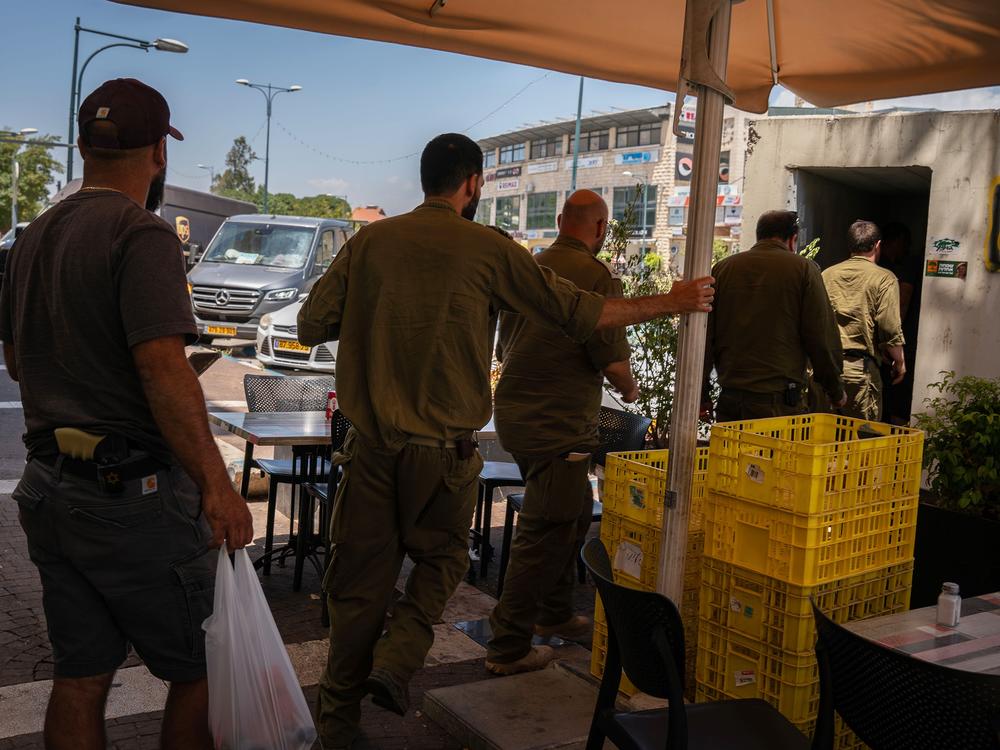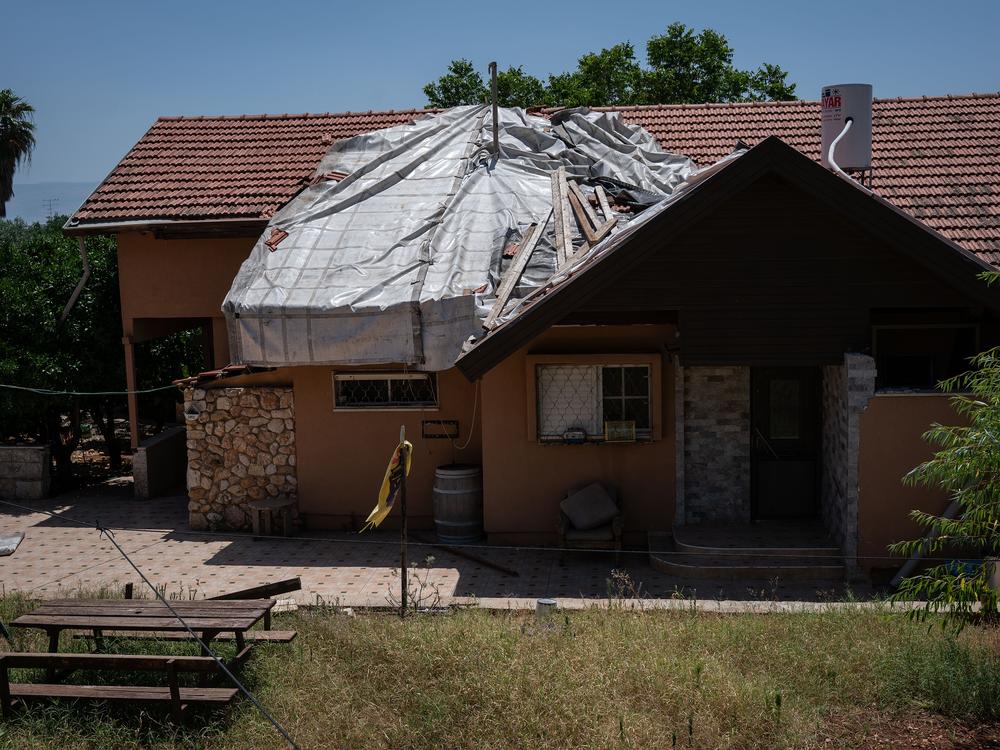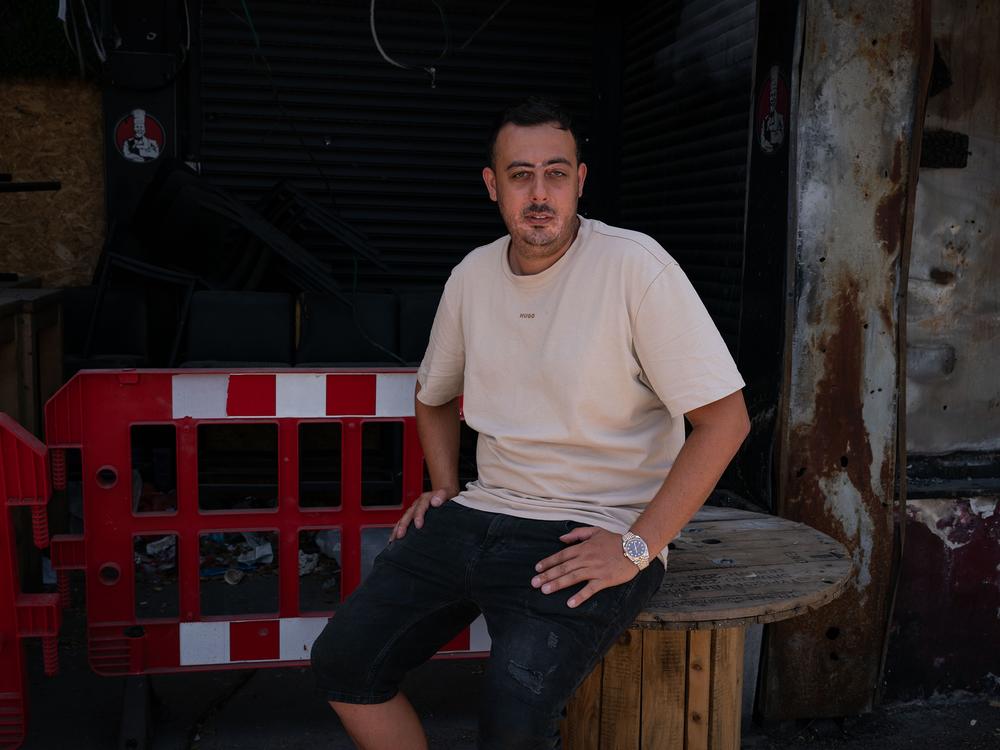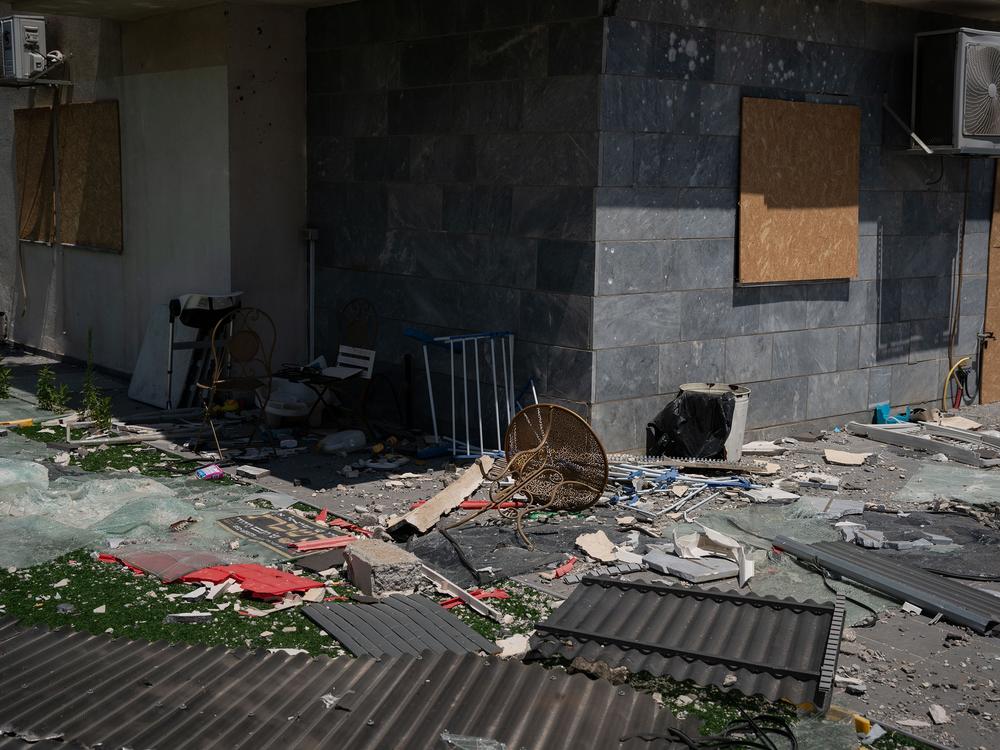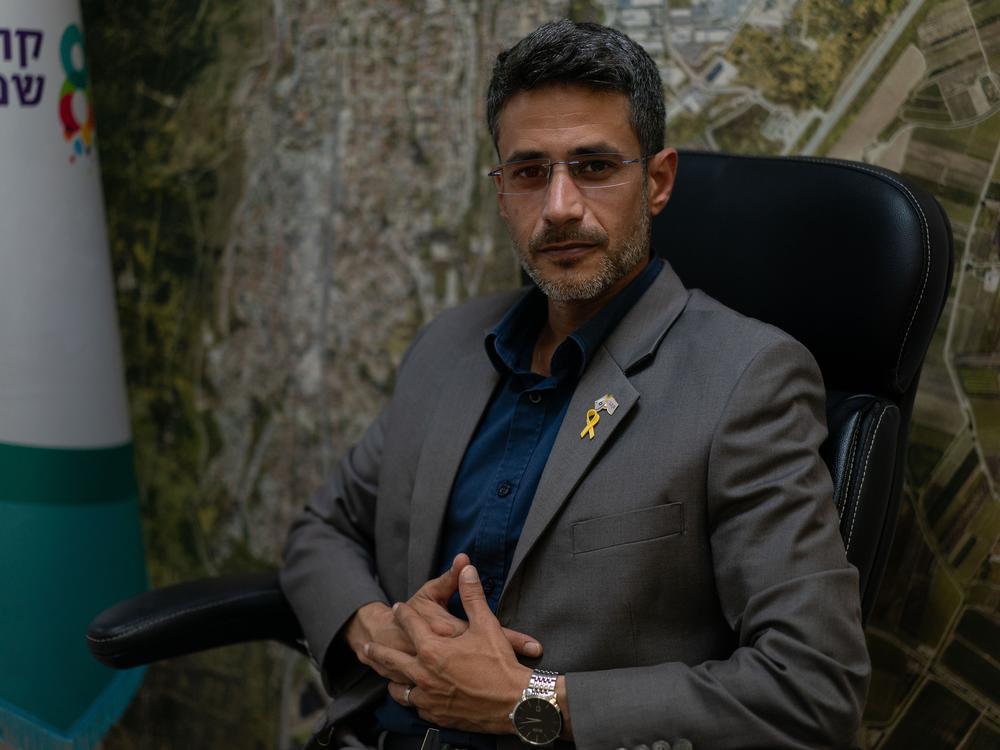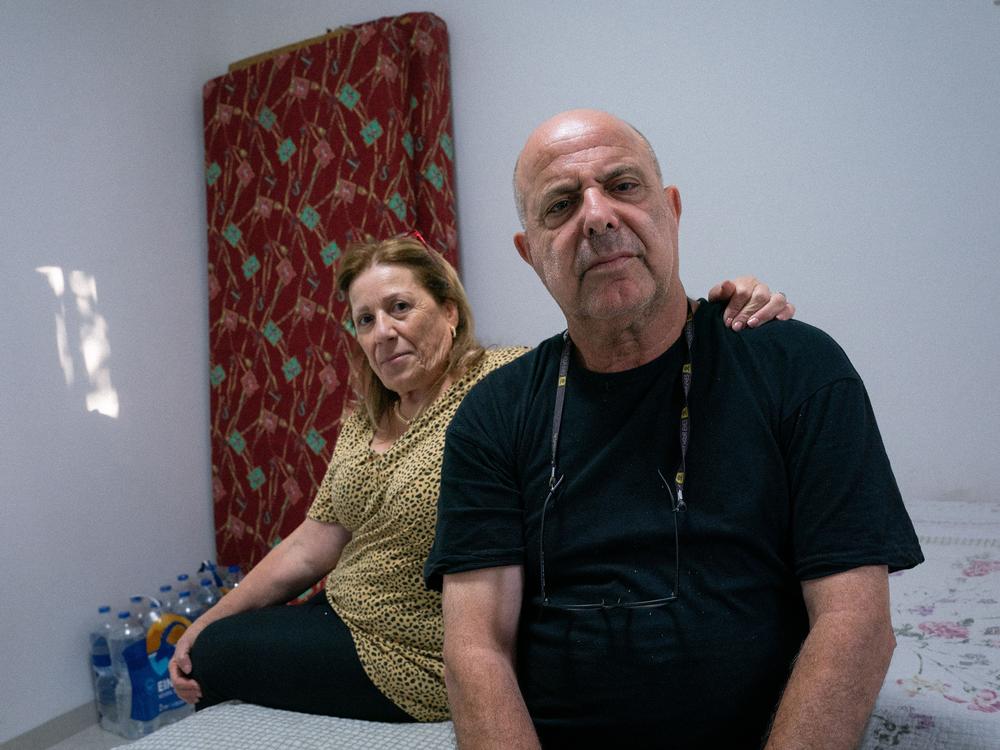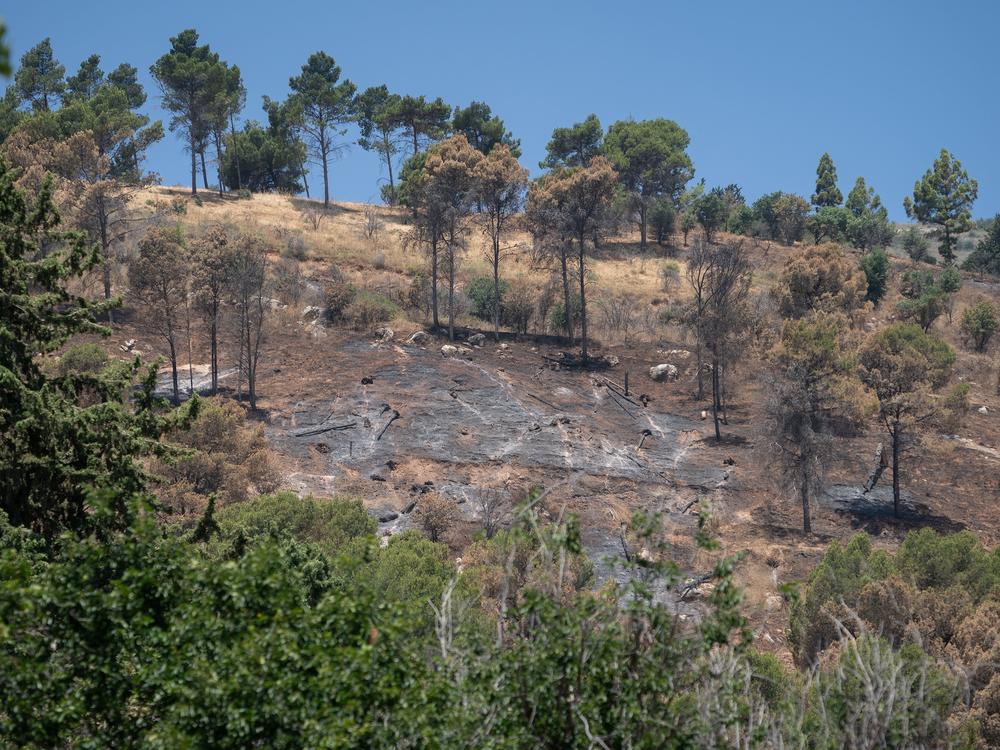Section Branding
Header Content
For Israelis near the Lebanon border, war with Hezbollah feels inevitable
Primary Content
KIRYAT SHMONA, Israel — Sarah Ben Hamo has been trying to get the floors of her apartment clean for weeks. They’re normally white, but right now they’re black with soot from all the forest fires that have been burning nearby.
“Now, there’s a bit of quiet, maybe a slight respite,” the 58-year-old says. She’ll get some water and soap ready quickly, she says.
Fires have been burning across northern Israel, including the areas surrounding Kiryat Shmona — a result of the barrage of rockets that Hezbollah has been shooting over the border from southern Lebanon. The Israeli military intercepts a majority of them, but even those interceptions cause explosions and the sparks and shrapnel rain down on the dry brush and trees that cover the hills.
Israel and Hezbollah have been in a low-grade war since the Iranian-backed group fired at Israel in a show of solidarity with Hamas after the beginning of the war in Gaza last October, when Hamas-led militants killed 1,200 people in Israel and took some 240 hostages. The exchange of fire between Hezbollah and Israel has intensified in recent weeks, and Israelis have been eyeing the possible beginning of a full-out war in the north. The Israeli military has been preparing for such a conflict, and tens of thousands of residents were ordered by the government to evacuate from border towns like Kiryat Shmona last October. Many have been living at hotels or with family, spread throughout Israel, since then.
Ben Hamo evacuated with her family months ago, but comes back during the weekdays to work her job at the local supermarket. It’s the only one still operating in town, and she needs the money. She’s standing outside her apartment building, arms filled with groceries. She plans to check on the apartment, cook dinner for her family and then bring the food back to the hotel they’re all living in further south.
“Sometimes there are 10 or more explosions a day,” she says. “Sometimes a siren sounds before, and sometimes it doesn’t sound at all. It’s really scary.”
She points across the street to a house with a giant hole in the roof, covered by a tarp. She says just last month, a rocket crashed into it. She was in her kitchen and the explosion threw her across the room. After she recovered, she was so afraid that she ran to her car and drove away without even buckling her seat belt.
This neighborhood is full of three-story apartment buildings, but it’s eerily quiet. There are very few cars. Several buildings have rocket damage. There’s a bomb shelter on every street. Ben Hamo says the only people still living here are mostly elderly or disabled.
When asked why she doesn’t just leave, move away from the border for good, Ben Hamo looks defiant.
“Because someone needs to live in this place, and it’s us!” she answers.
Kiryat Shmona was once a Palestinian town called Al-Khalissa before the war leading to Israel’s creation in 1948, when Palestinians were forced to leave. Many of those families still live across the border in Lebanon, hoping to come back someday.
Today, downtown is completely shuttered, save for one shawarma restaurant still operating, packed with Israeli soldiers at lunchtime. The restaurant next to it is now a pile of twisted metal and ash, after a direct hit from a rocket a few months ago.
Mayor Avichai Stern is taking meetings in the bomb shelter deep below the town’s city hall. There have been too many sirens today. He’s used to this setup by now, though, after months of fighting. He says this is practically his office these days.
He explains that most of the 24,000 residents of Kiryat Shmona are now spread between 460 different locations in Israel, with four hubs where makeshift schools have been set up. He says his goal is for people to be able to return before the new school year starts in September.
But at this point, he doesn’t think that’s possible without a war.
“For residents to be able to return here, we need to remove the threat we have today from the north,” Mayor Stern says, referring to Hezbollah. “Especially after what we saw in the south [in the Oct. 7 Hamas attack], we cannot return here like sheep to the slaughter and wait for them to overrun us as they did there.”
He says he doesn’t think diplomacy will work in this situation, so he’s resigned himself to what he thinks is inevitable.
“We do not want war. We did not want war in Gaza either, but I think today we all understand that the question is not whether there will be war, but whether the war will be now or later,” he says.
Roughly 40 miles west of Kiryat Shmona is the seaside city of Naharriya. On the way there, the hills on either side of the highway occasionally billow with smoke – fires burning from recent rocket hits. The air smells like campfire.
Nahariya hasn’t been evacuated – yet. Many of the 75,000 residents still live here – including Yaffa and Moshe Nahon. They’ve just installed a state-of-the-art safe room in their home of 40 years.
It will protect against shrapnel from rockets, has a bulletproof door and an air filtration system in case of chemical attack. The whole thing cost around $100,000, but they say it’s worth it if it means their three kids and three grandkids can still visit and feel safe.
They say almost all their friends and neighbors are building a room like this in the past few months, after seeing what happened in the south last Oct. 7 and then experiencing the increase in rocket fire up here. There’s such high demand it’s almost impossible to find a contractor.
The couple both grew up in the north, and have lived here all their lives, through two major wars with Lebanon – first in 1978 and again, against Hezbollah, in 2006. They say people up here understand that war, as terrible as it is, brings long-lasting calm.
“Once there's a war, afterward there will be quiet, and not just a little of it,” Yaffa says, remembering the nearly 18 years of relative peace after 2006. “I think the people here deserve to live in peace already."
Yaffa says just earlier that day, she watched a young girl run for a bomb shelter as a siren wailed. The little girl was so nervous she was shaking.
“Kids shouldn’t have to live this way,” Yaffa says.
Nahariya's beachside walkway would normally be packed with people in the early summer. This evening, just a few still stroll along, enjoying the breeze. One man walks a small dog. A young couple sits to take in the sunset.
Suddenly, a siren sounds. People continue with their walks. There have been multiple sirens here just today.
A nearby explosion rips through the air. The boom echoes off the nearby buildings.
The man stops to comfort his dog. The young couple glances around uneasily. And then, life continues.
Itay Stern contributed to this report in northern Israel.
